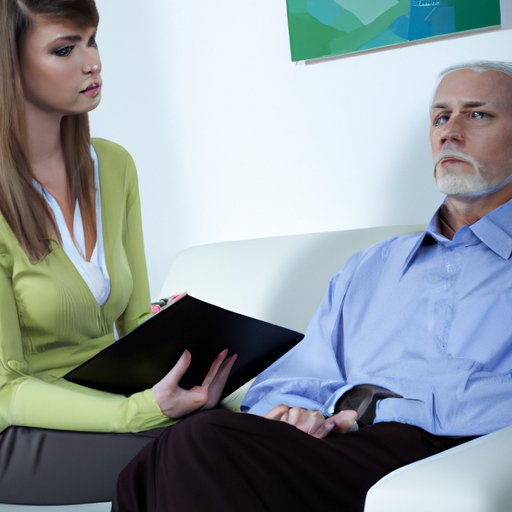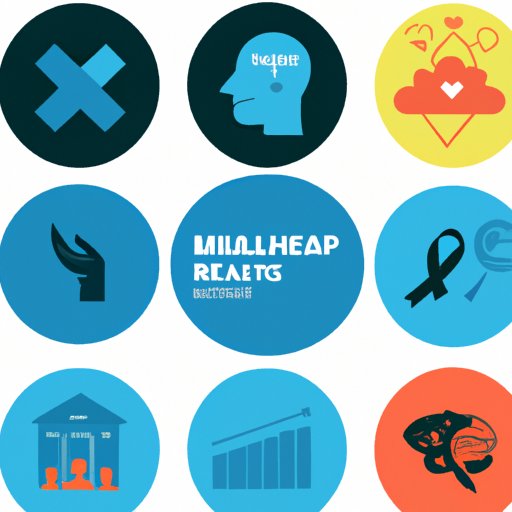Introduction
Mental health is a term that refers to a person’s emotional, psychological, and social well-being. It is important to take care of our mental health just as we would with our physical health. Unfortunately, many people struggle with mental health issues throughout their lives, and it can be difficult to know where to turn for help. In this article, we will discuss how to get help for mental health, including speaking to a trusted friend or family member, visiting a mental health professional, joining a support group, using online resources, exercising regularly, and practicing mindfulness and relaxation techniques.
Speak to a Trusted Friend or Family Member
When it comes to getting help for mental health, one of the first places to turn is to a trusted friend or family member. Talking to someone who knows you and cares about you can be incredibly beneficial. They can provide support, offer advice, and help you find additional resources. Additionally, having a safe space to talk about your feelings can help reduce stress and increase your overall wellbeing.
When approaching the conversation, it’s important to keep in mind that your friend or family member may not have all the answers. That’s okay! The important thing is that they are there to listen and support you. Try to be as open and honest as possible when talking about your mental health. You don’t have to go into too much detail if you’re not comfortable, but providing some context can help them better understand what you’re going through.

Visit a Mental Health Professional
Another way to get help for mental health is by visiting a mental health professional. There are many types of professionals available, including psychologists, psychiatrists, counselors, and therapists. Each type of professional has their own specialized skills and approaches, so it’s important to do your research to find the right fit for you.
When selecting a mental health professional, there are a few questions you should ask to ensure you are making the best choice. These include: What is their experience and background? How long have they been practicing? What do they specialize in? What is their treatment approach? How often will you meet? What is their fee structure? Answering these questions can help you make an informed decision.
Join a Support Group
Joining a support group can also be a great way to get help for mental health. Support groups are made up of people who are facing similar challenges, and they provide a safe and supportive environment where members can share their experiences, offer advice, and provide emotional support. Being part of a group can also help reduce feelings of isolation and provide motivation to stay on track with your goals.
If you’re looking for a support group near you, start by searching online. Many cities have mental health organizations that offer free or low-cost support groups. If you’re unable to find a local group, there are also online support groups available. These virtual communities can provide the same benefits as in-person groups.
Use Online Resources
In addition to in-person and online support groups, there are many helpful online resources available to those seeking help for mental health. These include websites, forums, blogs, and other online communities. These resources can provide information, support, and advice from people who are going through similar struggles. Additionally, many of these sites offer anonymous forums where you can share your story without fear of judgment.
Some popular online resources include Mental Health America, Psych Central, and NAMI (National Alliance on Mental Illness). These websites provide information on mental health conditions, treatments, and resources to help you find additional support.
Exercise Regularly
Regular exercise is another great way to get help for mental health. Exercise releases endorphins, which can improve mood and reduce stress. It can also help increase energy levels, improve sleep quality, and boost self-confidence. Even a small amount of activity can make a big difference, so it’s important to incorporate physical activity into your daily routine.
When it comes to incorporating exercise into your day, the key is to make it enjoyable. Find activities that you enjoy and look forward to doing. This could be anything from taking a walk in the park to playing a pick-up game of basketball. Also, try to set realistic goals and focus on progress rather than perfection. Every little bit counts!

Practice Mindfulness and Relaxation Techniques
Mindfulness and relaxation techniques can also be helpful when it comes to getting help for mental health. Mindfulness is the practice of being present in the moment and observing your thoughts without judgment. It can help reduce stress, improve focus, and increase self-awareness. Relaxation techniques, such as deep breathing, progressive muscle relaxation, and guided meditation, can help reduce anxiety and increase feelings of calm and wellbeing.
These practices can be done anytime, anywhere. All you need is a quiet space and a few minutes of your time. There are also apps, such as Headspace and Calm, that can provide guided mindfulness and relaxation exercises to help you get started.
Conclusion
Mental health is an important part of overall wellbeing. Taking care of our mental health can be difficult, but there are many resources available to help. Speaking to a trusted friend or family member, visiting a mental health professional, joining a support group, using online resources, exercising regularly, and practicing mindfulness and relaxation techniques can all be helpful when it comes to getting the support you need.
If you or someone you know is struggling with mental health issues, please remember that you are not alone and help is available. Reach out to a trusted friend or family member, visit a mental health professional, or take advantage of the many online resources available. Remember that taking care of your mental health is just as important as taking care of your physical health.
(Note: Is this article not meeting your expectations? Do you have knowledge or insights to share? Unlock new opportunities and expand your reach by joining our authors team. Click Registration to join us and share your expertise with our readers.)
